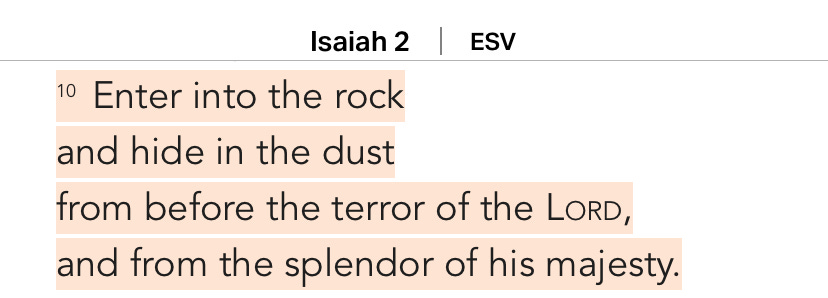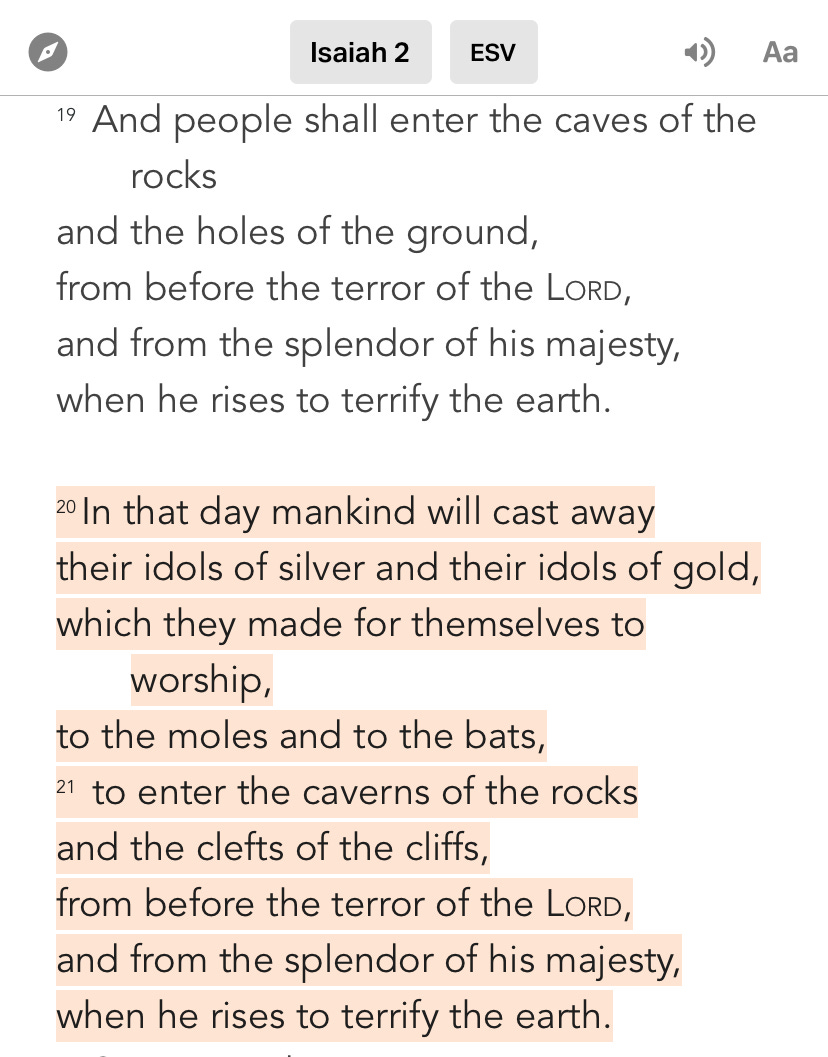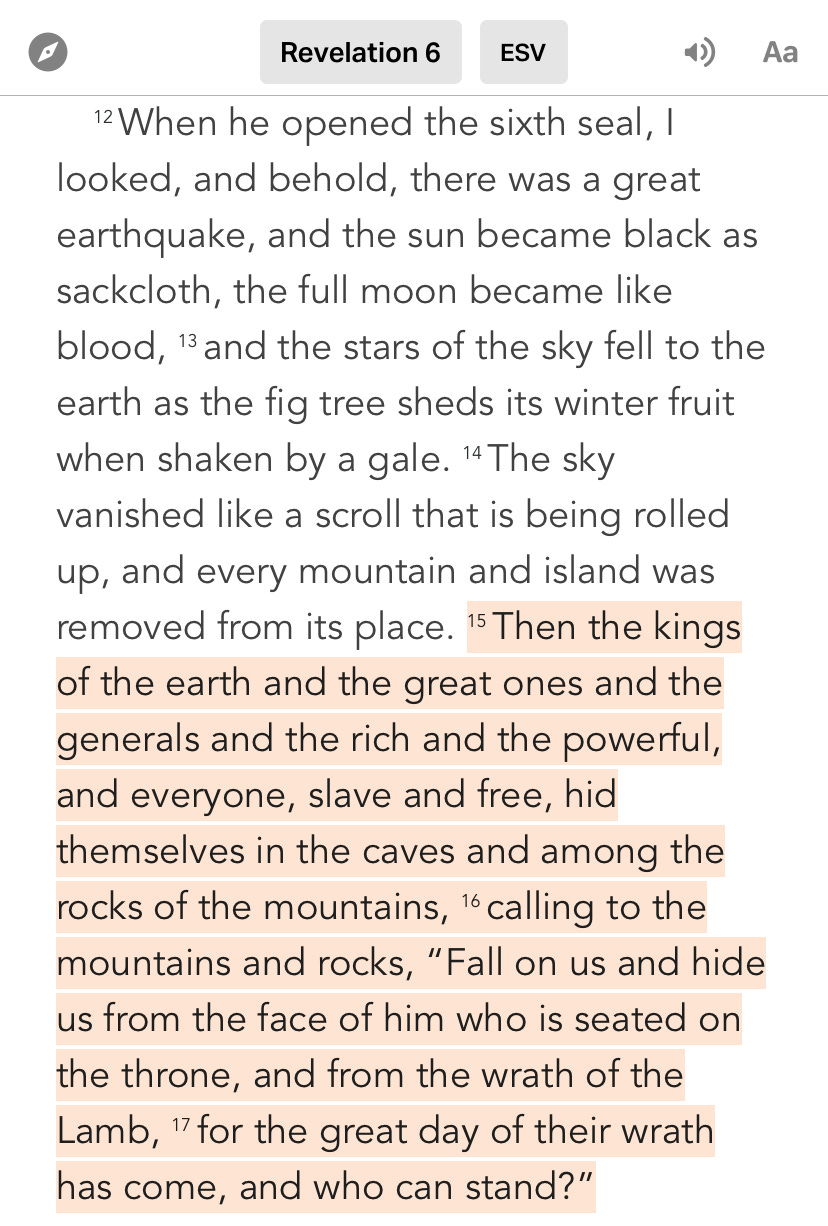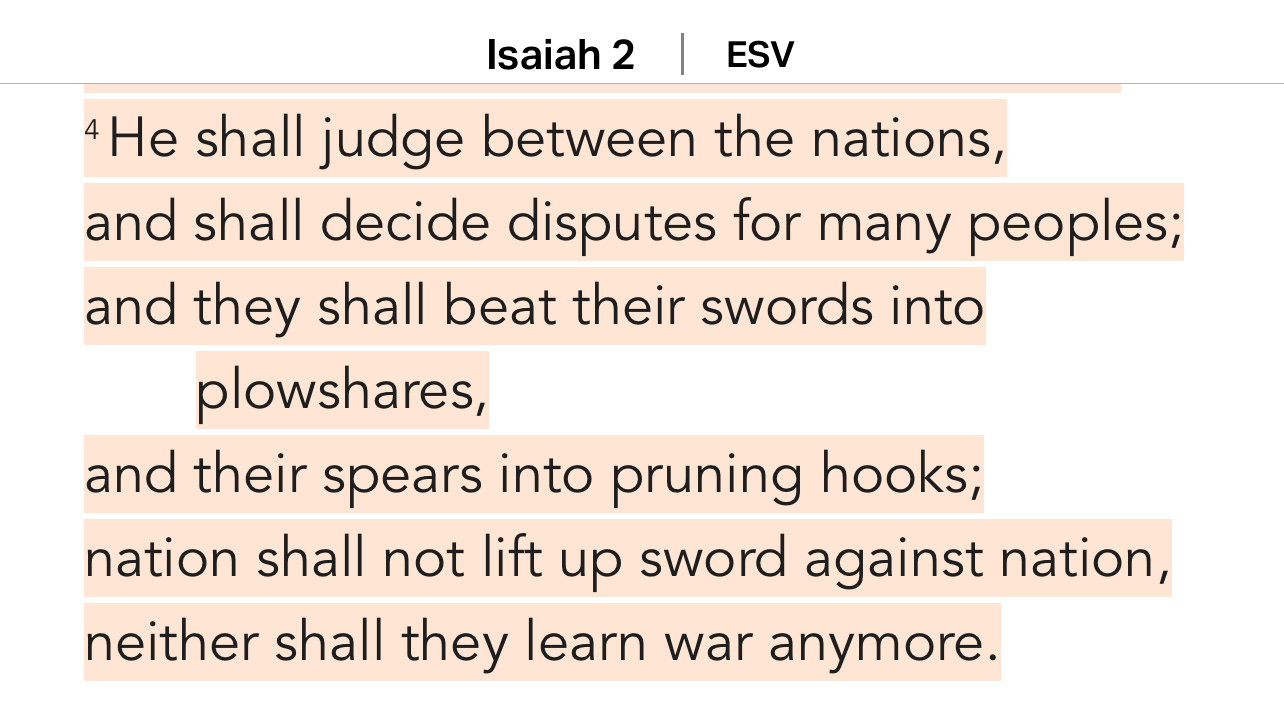A Commentary on Isaiah 2, Pt. II: The Day of the Lord
"The kingdom of God will be taken away from you and given to a people producing its fruits... the one who falls on this stone will be broken to pieces; and when it falls on anyone, it will crush him."
Note: This is part II of a series on Isaiah 2. If you have not read part I yet, you can read it here. It has been a while since I published part I, so if you have read it, I encourage you to briefly review it before proceeding with part II. (The verse in the tagline is Matthew 21:43-44.)
The last time we opened Isaiah 2, we examined the first 5 verses and the picture they paint of Christ, the mountain of the house of the Lord, being exalted above all the mountains. We integrated the theme repeated in scripture of God appearing twice to nations and individuals. We extrapolated the present day implications. And we compared this interpretation of the passage to the premillennial (especially dispensational) understanding, which says that the entire chapter is future to us and irrelevant to the past or present.
The first five verses illustrated God’s first appearance to the house of Jacob and, subsequently, to the whole world. That is to say, God gave his word and instruction through Christ’s coming to earth in the flesh. This section of Isaiah came to a close for the nation of Israel in 70 AD when the Lord came in judgment and destroyed the city and the temple. However, these verses are ongoing for the gentile world because the word of God (the gospel) is still going forth and the nations are flowing to Christ in and through his church.
This brings us to the second section of Isaiah and the corresponding “second coming” of the Lord. The pieces of this article will be a little out of order, but you may see why by the end. I want to start with a few verses toward the end of Isaiah 2.
Hiding In the Rocks
In contrast to the nations flowing to THE rock (aka, the mountain higher than all the others) for refuge in verses 1-5, we have people looking for refuge among the smaller rocks, desperate to cover themselves from the face of the Lord.
If you are a student of eschatology, this might sound familiar to you. We can flip to Revelation and find a passage that feels identical:
One might suppose that because these passages are so far removed from one another that they are talking about two separate events. However, Isaiah is one of the most referenced books in Revelation. In fact Isaiah 2:10-12, 19 is exactly what is being referenced here. The two passages are describing the same event. But that doesn’t mean it’s an event that happens only once. Just as the Word of God is always being presented to nations and individuals, so the judgment of God is always following.
Because premillennial eschatology projects the book of Revelation into the future (except for the first 5 chapters), they must interpret this portion of Isaiah as either a separate event from the passage in Revelation or as strictly in the future.
A Side Note: Moses Hiding in the Rocks
Now, it’s not the main point I want to draw out, but there is one biblical scene that comes to mind when reading these verses. It may not feel like an obvious place to go, but I want to include it just because it is an amazing cross reference. This event took place on top of another famous mountain.
Exodus 33:18-23:
Moses said, “Please show me your glory.” And he said, “I will make all my goodness pass before you and will proclaim before you my name ‘The LORD.’ And I will be gracious to whom I will be gracious, and will show mercy on whom I will show mercy. But,” he said, “you cannot see my face, for man shall not see me and live.” And the LORD said, “Behold, there is a place by me where you shall stand on the rock, and while my glory passes by I will put you in a cleft of the rock, and I will cover you with my hand until I have passed by. Then I will take away my hand, and you shall see my back, but my face shall not be seen.”
Isn’t it interesting that Moses was standing on the rock (Matt. 7:24-27) but also had to hide in the cleft of a rock? We’ll come back to this a bit later.
Satan Bound When the Word Went Forth
In Part I, we discussed what it meant that “out of Zion shall go the law, and the Word of the Lord from Jerusalem.” To refresh: “The word of God is no longer bound up in Israel in a written code, but is now written on the heart of every believer and the whole world has access to the Word that has gone out from Zion.”
There was a reversal at Pentecost that relates to one of the most controversial passages of Revelation. This stark change should be as recognizable to us as the division between the old and new testament, but has, unfortunately, been muddled by a futuristic interpretation. Revelation 20:1-3:
“Then I saw an angel coming down from heaven, holding in his hand the key to the bottomless pit and a great chain. And he seized the dragon, that ancient serpent, who is the devil and Satan, and bound him for a thousand years, and threw him into the pit, and shut it and sealed it over him, so that he might not deceive the nations any longer, until the thousand years were ended. After that he must be released for a little while.”
The implication is that there was a time that Satan was unbound and free to deceive the nations. The greatest divide in history relating to this change occurred 2,000 years ago with the coming of Christ. While the Word of God was previously “bound” in Israel and was revealed to the nations (unbound), the converse is true for Satan. At the time of Pentecost, Satan was no longer able to run rampant through the wider world that walked in darkness. Instead, he was “bound” at the same time that “the Word of the Lord [went out] from Jerusalem.” (Remember we can also think of this in terms of the Word of God previously being “concealed” in the Old Testament and “revealed” in the New Testament. This has everything to do with Satan being bound at the time the gospel went to the gentile world!)
Swords Into Plowshares
Remember, we are not going line by line through Isaiah 2, but comparing the themes in the chapter to other passages of scripture that use the same descriptive language.
Alongside mountains and other rocks, another theme presented to us in Isaiah 2 is the juxtaposition of war and farming:
The premillennial would suppose that this refers to Christ judging from a literal throne in Jerusalem and all war on earth has ceased during the millennial reign (well, except for that bit at the end where everyone rebels again and Satan is turned loose.) But what if, instead, we framed this text in light of God’s first and second appearances—the time before Christ and the time after; the time when God dispenses his Word to a people and the time he returns to judge them.
In the old covenant, the sword was a major part of Israel’s modus operandi. They conquered nations rather than converting them and spent an awful lot of time at war. The times they were defeated in battle and ejected from the land were directly tied to God’s judgment. In times of peace, agriculture would flourish and it was a picture of God’s blessing, just as Isaiah 2 pictures.
However, in the new covenant, we no longer live by the sword.
“You have heard that it was said, ‘An eye for an eye and a tooth for a tooth.’ But I say to you, Do not resist the one who is evil. But if anyone slaps you on the right cheek, turn to him the other also. And if anyone would sue you and take your tunic, let him have your cloak as well. And if anyone forces you to go one mile, go with him two miles. Give to the one who begs from you, and do not refuse the one who would borrow from you.” - Matthew 5:38-42
If the old covenant paradigm was the sword, the new covenant paradigm is the sowing of the seed. And this is bore out through the rest of Jesus’ ministry. Consider the parable of the sower in Matthew 13 and Jesus’ teaching on pruning in John 15. (Also passages like Luke 9:62 - “No one having laid the hand upon the plow, and looking on the things behind, is fit for the kingdom of God.”) Paul especially alluded to this reality of “nation shall not lift up sword against nation” when bringing the good news to the gentiles. (He was very busy with his plowshare sowing the seed of the gospel of peace.)
“But now in Christ Jesus you who once were far off have been brought near by the blood of Christ. For he himself is our peace, who has made us both one and has broken down in his flesh the dividing wall of hostility by abolishing the law of commandments expressed in ordinances, that he might create in himself one new man in place of the two, so making peace, and might reconcile us both to God in one body through the cross, thereby killing the hostility.” - Ephesians 2:14-16
Isaiah 2 is not speaking about the physical nations of the world no longer going to war and turning to farming. It speaks of nations no longer making war against one another in Christ. If you spend any amount of time in the epistles, you will quickly see how much time the apostles spent admonishing the church for her infighting. Because they have peace with God, they also should be at peace with one another. Because, in Christ, there is no Jew or gentile, no male or female, no rich or poor, no slave or free. Christ is walking among the lamp stands and judging between the nations, deciding disputes for many peoples.
We have collectively laid down our swords and no longer conquer the nations by going to war with them, but instead we sow the seed of the gospel by giving our lives as living sacrifices (Rom. 12:1) that the world might come to know Christ. At the same time, we are individually being sanctified to have peace with one another. Most significantly, we have laid down our sword and are no longer at war with God, nor he with us.
Plowshares Into Swords
Eventually, though, this time of sowing peace among the nations will come to an end. The Word of the Lord going forth always ceases after God has endured a stubborn people with much patience. It ended when the Jews rejected Christ and their land was conquered and their temple was destroyed. And it will eventually end for the whole world.
You can almost overlay Isaiah 2:6-22 with Revelation 18. That’s because the fall of Babylon in Revelation 18 and Isaiah 2:6-22 are the same picture of God coming in judgment against people who have rejected his Word. Just as the flourishing of Israel came to an end in a physical sense in the old covenant when she rebelled against God, so the wider world’s nations and people will cease to be when God returns to judge whether his Word was heeded and finds them wanting. In fact, we see a direct reversal of “swords into plowshares” when we open the book of Joel.
“Beat your plowshares into swords,
and your pruning hooks into spears;”
-Joel 3:10a
The first half of Joel 3 is about the Lord coming in judgment to people who have not only rejected his Word, but have persecuted his own people. While the people of God have traded the sword of conquering and self-interest for the plowshare so that the kingdom of God might multiply, God taunts his enemies who make war against him and his people, which is a terrifying place to be. In the end (just as foretold in Isaiah 2 and Revelation 18), all their self-interested, earthly flourishing will be dust because it was actually an act of war against God. Meanwhile, the suffering and death of God’s people will be exchanged for riches unimaginable.
And what will the rebels do when that day of God’s wrath comes? Refer back to the beginning of this article where Isaiah 2 and Revelation 6 sing in chorus:
“Then the kings of the earth and the great ones and the generals and the rich and the powerful, and everyone, slave and free, hid themselves in the caves and among the rocks of the mountains, calling to the mountains and rocks, “Fall on us and hide us from the face of him who is seated on the throne, and from the wrath of the Lamb, for the great day of their wrath has come, and who can stand?”
-Revelation 6:15-17
Who Can Stand?
So who CAN stand?
I am So. Glad. You. Asked.
“Everyone then who hears these words of mine and does them will be like a wise man who built his house on the rock. And the rain fell, and the floods came, and the winds blew and beat on that house, but it did not fall, because it had been founded on the rock.” - Matthew 7:24-25
That rock is exactly the same thing as the mountain of the Lord. The rock and the mountain are synonymous. We know from the first half of Isaiah 2 that everyone who goes up to the mountain of the Lord and walks in his paths will become that person who lays down his sword and puts his hand to the plow, laying down his life for his God and his fellow man. That mountain is Christ and those paths a man walks can be summed up like this:
“Teacher, which is the great commandment in the Law?” And he said to him, “You shall love the Lord your God with all your heart and with all your soul and with all your mind. This is the great and first commandment. And a second is like it: You shall love your neighbor as yourself.”
-Matthew 22:36-39
Addendum: What About Moses?
What about that random mention of Moses? Remember he was standing on the rock, but also hiding in the cleft of the rock. That’s because Christ hadn’t come yet. Moses put his faith in the Word of God, but he couldn’t yet see the full display of God’s glory, which we now see in the face of Christ. Moses being able to stand on the rock yet having to hide in the rock and only see God’s “back” is for the same reason that the glory of God rested over the tabernacle and the temple shined from atop the temple mount, and yet there was a veil that separated God’s full glory from the people.
But, spiritually speaking, there is no longer a veil. God no longer has to hide his face from us. We don’t have to run to the clefts in fear or hope that the small rocks of our earthly accomplishments will shield us from his judgment. He knows us and we know him. We, with unveiled faces, behold his full glory in Christ (Heb. 1:3, 2 Cor. 3:18). We don’t have to hide because we are hidden in Christ. We can just stand.







